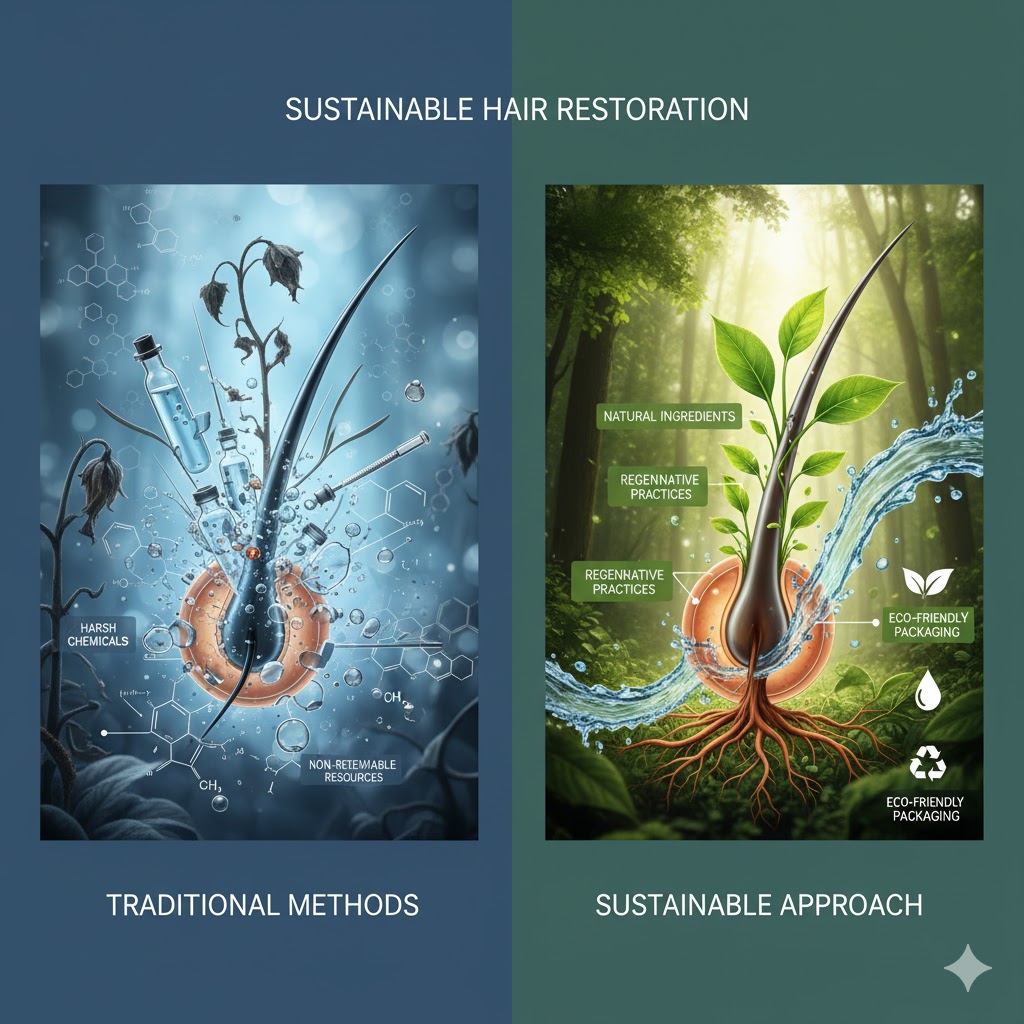Hair restoration has long been associated with personal transformation, confidence, and cutting-edge medical technology. But as the world becomes more environmentally conscious, another question has entered the spotlight: How sustainable is the hair restoration industry?
At ZMD Hair, we believe that true innovation means doing more than helping patients regain their hair—we must also consider how our practices impact the planet. In this blog, we explore the growing movement toward sustainability in hair restoration, from eco-conscious materials to waste reduction and energy-efficient treatments.
Why Sustainability Matters in Medical Aesthetics
The Environmental Footprint of Modern Clinics
Every medical practice leaves a footprint. From single-use tools and chemical-based products to energy-intensive equipment and packaging waste, the environmental cost of cosmetic procedures—including hair restoration—is often overlooked.
Surgical and non-surgical treatments generate:
- Medical waste (e.g., syringes, bandages, gloves)
- Packaging from topical medications and aftercare kits
- Power consumption from diagnostic and procedural tools
- Emissions related to patient travel and international sourcing
As patients become more eco-conscious in their lifestyle choices, they are also beginning to ask more from the clinics they trust—clinics like ZMD Hair, where we are rethinking what “high-quality care” truly means.
What Is Sustainable Hair Restoration?
Sustainable hair restoration refers to the integration of environmentally responsible practices at every stage of care—without compromising results. This involves not just the treatment itself, but how materials are sourced, how waste is managed, and how patients are educated to care for their scalp in ways that are gentle on the earth.
At ZMD Hair, we’re leading the shift toward greener medicine by evaluating our clinical operations through an eco-conscious lens. Sustainability isn’t a trend—it’s a responsibility.
Eco-Friendly Advancements in Hair Restoration
1. Biodegradable and Recyclable Medical Supplies
Traditional clinics often rely heavily on plastic-based tools and packaging. While some disposables are necessary for sterility, many clinics are now sourcing biodegradable alternatives or partnering with suppliers who offer recyclable materials.
ZMD Hair has begun replacing certain single-use items with eco-conscious alternatives and prioritizing supply vendors who share our sustainability goals.
2. Low-Energy Devices for Scalp Therapy
Low-Level Laser Therapy (LLLT), a common non-surgical hair restoration technique, is increasingly being offered using energy-efficient devices. These tools are engineered to minimize power consumption while delivering effective stimulation to hair follicles.
We use FDA-cleared, energy-smart devices that reduce both environmental impact and utility load—without compromising therapeutic benefit.
3. Eco-Conscious Product Formulation
Topical products and post-procedure care often include synthetic preservatives, plastic packaging, or harmful byproducts that end up in waterways. Sustainable clinics are now shifting toward:
- Organic ingredients
- Recyclable or refillable containers
- Cruelty-free and vegan formulations
Our proprietary aftercare systems at ZMD Hair are curated with plant-based, ethically sourced ingredients. We minimize chemical load without compromising skin safety or follicular health.
Reducing Waste Without Sacrificing Sterility
The Medical Balancing Act
One of the biggest challenges in sustainable aesthetics is finding the right balance between reducing waste and maintaining the highest standards of cleanliness and sterility. Certain items—like surgical drapes or syringes—must be disposable. However, smart protocol design can dramatically reduce overuse.
At ZMD Hair, our waste-reduction strategy includes:
- Streamlined procedure kits to eliminate excess
- Digital recordkeeping to reduce paper waste
- Conscious procurement to avoid unused inventory expiration
- Proper sorting of recyclable vs. biohazard materials
Even small shifts—like switching to reusable surgical gowns or offering digital brochures—can add up over time.
Ethical Sourcing in Hair Transplants
Sustainability Goes Beyond Materials
Sustainability also includes how we treat people in our global supply chain. Some clinics source tools or pharmaceuticals from unverified vendors, potentially supporting unethical labor practices or environmental violations.
ZMD Hair only partners with certified, transparent manufacturers who comply with ethical and environmental guidelines. From surgical instruments to micronutrient supplements, we ensure every component of our service reflects both scientific excellence and responsible sourcing.
Supporting Scalp Health With Minimal Environmental Harm
Eco-conscious care also involves patient education. We help our patients:
- Avoid unnecessary chemical-based shampoos
- Use less water-intensive scalp care methods
- Choose hair-friendly diets that align with sustainable food systems
We encourage patients to adopt simple, sustainable routines that support both follicle vitality and planetary health.
A Look Toward the Future: Greener Innovations in Hair Science
Hair restoration is rapidly evolving—and with it comes exciting opportunities for sustainable breakthroughs.
Research Areas We’re Watching:
- Lab-grown hair follicles that reduce the need for donor areas
- Biocompatible scaffolding for follicle implantation
- AI-assisted diagnostics to reduce travel-based emissions
- Carbon-neutral shipping for medical products
ZMD Hair is committed to investing in sustainable technology and staying at the forefront of ethical innovation. Our mission goes beyond aesthetics—it’s about reshaping the industry to support life, confidence, and conservation.
How Patients Can Be Part of the Sustainability Movement
Sustainability in hair restoration isn’t just about what the clinic does—it’s about what patients choose to support. If you’re looking to make eco-conscious decisions in your hair restoration journey, consider:
- Choosing clinics that prioritize green practices
- Asking about product ingredients and packaging
- Following eco-friendly aftercare routines
- Supporting treatments with minimal energy use
- Encouraging your provider to adopt sustainable policies
When patients start asking the right questions, the industry listens—and adapts.
Conclusion:
Sustainable hair restoration is no longer a niche concept—it’s a necessary evolution. As the planet faces mounting environmental challenges, industries of all kinds must adapt—and that includes aesthetics and regenerative medicine.
At ZMD Hair, we are proud to pioneer eco-conscious approaches that blend world-class care with responsible choices. From ethical sourcing to low-energy therapies and sustainable aftercare, our goal is simple: to help you restore your hair while respecting the planet we all share.
🌍 Your transformation shouldn’t cost the Earth.
📞 Ready to begin your hair restoration journey—sustainably?
Visit ZMDHair.com or call us today to schedule a private consultation. Let’s build a greener future, one follicle at a time.




